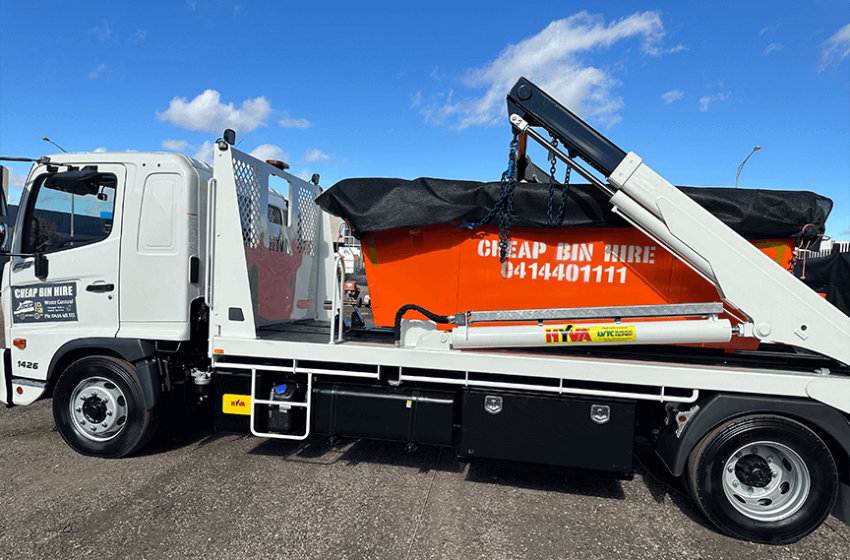Industrial Skip Bin Hire: Efficient Waste Management Solutions for Heavy-Duty Projects

Industrial projects often generate large volumes of waste, from scrap metals to hazardous materials. Proper waste management is essential to maintain a clean and safe environment, comply with regulations, and optimize operational efficiency. Industrial skip bin hire provides a convenient, cost-effective solution for managing substantial and varied waste generated by manufacturing plants, construction sites, and other heavy-duty operations. This article delves into the key benefits, types, and considerations for hiring industrial skip bins hire to manage waste for large-scale projects.
Benefits of Industrial Skip Bin Hire
-
Efficient Waste Collection
Industrial projects produce substantial waste that requires proper segregation and collection. Industrial skip bins come in various sizes, allowing you to choose the right capacity based on your project’s needs. A reliable waste management service ensures timely delivery and pickup of bins, maintaining efficiency and preventing overflow. -
Enhanced Safety
Accumulated waste can create hazards on industrial sites, increasing risks of accidents and injuries. Skip bin hire helps keep the workplace organized, eliminating hazards caused by scattered debris and providing a designated area for waste disposal. -
Regulatory Compliance
Industrial waste often includes materials that require specific disposal methods. With industrial skip bin hire, businesses can comply with local and federal regulations related to waste disposal. Professional skip bin providers understand the legal requirements and help ensure that waste is managed in accordance with environmental regulations. -
Cost Savings
Skip bin hire can be a more economical option than investing in waste management infrastructure and hiring dedicated personnel. Renting bins only when needed can help businesses control costs, avoiding long-term expenses associated with owning waste management equipment. -
Eco-Friendly Disposal
Most skip bin services follow environmentally friendly practices, including waste recycling and proper disposal of hazardous materials. By hiring an industrial skip bin, businesses can ensure their waste is handled in an eco-conscious manner, reducing their environmental footprint.
Types of Industrial Skip Bins
Industrial skip bins are available in different sizes and types to accommodate various types of waste. Some commonly used skip bins for industrial purposes include:
-
Hook-Lift Bins
Hook-lift bins are ideal for heavy-duty materials such as scrap metals, concrete, and large debris. They come in larger sizes and can be quickly loaded and unloaded using a hook-lift truck, which is especially beneficial for construction and demolition projects. -
Roll-On Roll-Off (RoRo) Bins
RoRo bins are larger than traditional skip bins and are suitable for substantial waste volumes. These bins are transported on specially designed trucks and are ideal for construction sites or manufacturing facilities with high waste outputs. -
Open-Top Bins
Open-top bins offer easy access and are generally used for bulky waste such as wood, bricks, and plastics. These bins are suitable for sites that require frequent waste removal and are particularly beneficial for large-scale remodeling or refurbishment projects. -
Sealed or Lidded Bins
Sealed bins are designed to contain hazardous or odorous waste. They are perfect for projects dealing with sensitive materials and help prevent environmental contamination and unpleasant odors.
Factors to Consider When Hiring Industrial Skip Bins
-
Type of Waste
The nature of your industrial waste will determine the type of skip bin you need. For instance, hazardous waste such as asbestos requires specialized sealed bins, while general construction debris may require a standard open-top or RoRo bin. -
Capacity and Size
Industrial skip bins range from small 8-cubic-meter bins to large 40-cubic-meter bins. It’s essential to choose a bin size that aligns with the waste output of your project, avoiding unnecessary costs for excess space or additional pickups. -
Location and Accessibility
Industrial sites often have limited space, and skip bin placement should not obstruct operations. Ensure the area selected for the bin is easily accessible for loading and unloading by trucks to prevent logistical challenges. -
Recycling Options
Many skip bin hire companies offer recycling solutions. Opt for a provider that segregates and recycles waste, which is essential for eco-friendly industrial practices and can potentially lower overall waste management costs. -
Duration of Hire
Most skip bin services offer flexible hire periods, allowing you to rent bins for as long as your project requires. However, it’s critical to coordinate with your provider regarding collection schedules to avoid project delays or additional fees.
Conclusion
Industrial skip bin hire is a strategic approach to handling large quantities of waste generated by industrial operations. With options that cater to different waste types and site requirements, skip bins ensure safe, cost-effective, and environmentally responsible waste management solutions. By understanding your waste disposal needs and collaborating with a reliable skip bin provider, you can streamline your waste management practices, maintain a safe working environment, and contribute to sustainable industry practices.

